What is post-judgement interest on debt and damages? What type on interest is this? The Judicial Proceedings (Interest on Debts and Damages) Act 2015 makes provision for post-judgement on debt and damages.
What is post-judgement interest?
Post-judgement interest can apply to judgement by the court in cases involving a claim for debt or damages. In such a claim, the Court may make a finding for in favour of the claimant and consequently order for payment of the debt or the damages. When the Court makes such an order for payment, the judgement creditor must pay. If the judgement creditor does not pay, then interest would accrue from the date when the judgement is made until the date when the judgment debt is settled in full. This is post-judgement interest and it is covered under Section 6 of the Judicial Proceedings (Interest on Debts and Damages) Act 2015.
Pre-judgement versus post-judgement interest
In Polem Enterprise Ltd v Attorney-General of Papua New Guinea [2010] PGSC 20; SC1073 the Court comprising of Judges Kirriworm, Cannings and Manuhu set out the difference between a pre-judgement interest and post-judgement interest on debts and damages. A post-judgement interest is the interest on debts and damages that is calculated from the date after the judgement is made to the date when the judgement is paid. On the other hand, pre-judgement interest is the interest on debts and damages that is calculated from the date when the cause of action accrued to the date when the judgement is made.
There are two requirements that you must meet to claim post-judgement interest, and these are as follows:
- The Court must give a judgement or order for the payment of money.
- The Court must not make an order that post-judgement interest will not apply to the judgement.
Is post-judgement interest mandatory?
The short answer is yes. In Manus Fuel Distributors Ltd v Madang Provincial Government [2019] PGNC 57; N7789 Justice Cannings considered whether post-judgement interest is mandatory and found that the terms Section 6 of Judicial Proceedings (Interest on Debts and Damages) Act 2015 are written in mandatory terms. Section 6 (1) states that “interest shall be payable at a fixed rate.” The use of the term “shall” signify that it is a mandatory requirement.
What is the interest rate?
In Manus Fuel Distributors Ltd v Madang Provincial Government [supra] Justice Cannings considered the interest rate applicable to post-judgement interest and noted that there is no prescribed rate in the Judicial Proceedings (Interest on Debts and Damages) Act 2015. Hence, his Honour considered the circumstances on the case at hand and decided that the appropriate action, to take in that case, is to apply the same interest rate of 8% per annum that was applied, in that case, to the pre-judgement interest.
Although the Judicial Proceedings (Interest on Debts and Damages) Act 2015 does not provide s prescribed interest rate for pre-judgement interest, the National Court Rules 1983 makes provisions for it under Order 12 rule 6. This provision provides that where the Court make and order for payment of money and includes in that order the payment of interest, then pre-judgement interest shall be payable. This interest rate applicable is 8% per annum.
Does post-judgement interest apply to the State?
The short answer is yes, it does apply to the State. However, the interest rate differs from ordinary cases or judgement creditors. The interest rate applicable to the State should not exceed 2% per annum.
There is a prescribed procedure to that a judgement creditor must follow to claim post-judgement interest against the State. A summary of these procedures are as follows:
- Serve a certificate of judgement on the State.
- Serve a certificate of taxation on the State.
- These payments will be deemed to be made at the date of the drawing of the cheque.
- If there was an appeal and the judgement debt is increased, then post-judgement interests would only apply to the increase, and it will take effect on the date the appellate judgment was made.
Exceptions to the application of post-judgement interest
If the claim is based on Common Law, then the judgement creditor is not entitled to post-judgement interest if the judgement debtor pays the damages as ordered by the Court within 30 days from the date the Court order was served on him by the judgement debtor.
Furthermore, in a claim for damages based on Common Law, if the Court awards a fixed amount for costs against a party and that party pays that cost within 30 days of the Court order, interest will not apply to it. Another case is where the Court orders costs against a party, but it is not a fixed cost. The cost is subject to taxation. In such a case, interest is not applicable. In both cases, if the Court orders that interest would able that interest would apply. However, in the absence of specific court orders to this effect, interest would not apply.
In conclusion, post-judgement interest is a right of the judgement creditor and can only be set aside is the Court orders specially states that it does not apply. This type of interest only applies to debts and damages.
For more similar articles, click here.










